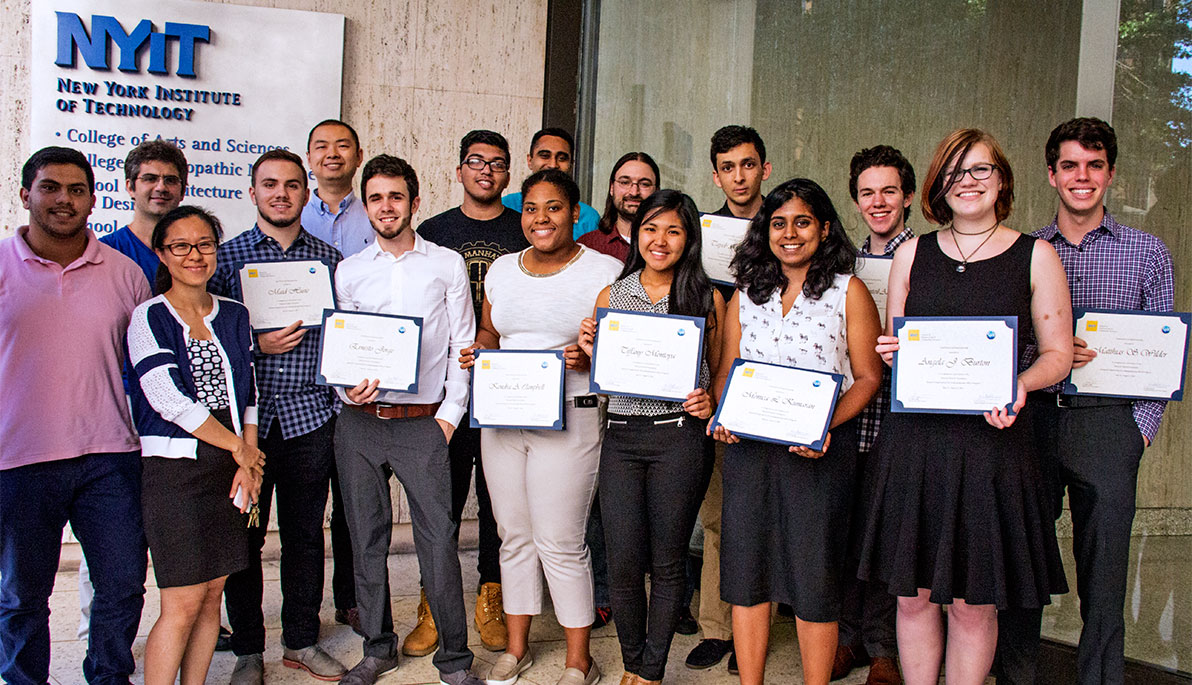News
REU Fellows Study Mobile Device and Wireless Security
August 25, 2016
Photo: Assistant Professor Ziqian (Cecilia) Dong, Ph.D., (second from left) stands with the 2016 REU fellows.
In August, aspiring cybersecurity professionals successfully completed NYIT’s Research Experience for Undergraduates (REU). Now in its fourth year, the program gives undergraduates the opportunity to work in state-of-the-art research facilities and perform and present projects with guidance from NYIT cybersecurity professor-mentors.
Led by NYIT Assistant Professor Ziqian (Cecilia) Dong, Ph.D., program is funded by a National Science Foundation (NSF) grant through 2019. This year, more than 150 students applied. Fellows from eight universities were chosen, including three from NYIT. Over the course of 10 weeks, REU fellows worked on topics ranging from research approaches to securing smartphone and wireless networks, public speaking, technical writing, and preparing for professional publications at professional conferences. They also enjoy lectures by industry experts, field trips, and cultural and social activities.
“The students collaborated with faculty mentors and among themselves, and they formed a close research community that uncovered some very interesting finding in mobile device and wireless security,” says Dong.
This year’s research focused on smartphone and network security. Topics included: indoor smartphone localization, geolocation of computers through network measurement, user authentication, and smartphone malware detection.
Examples of research included the following:
- Angela Burton (Vanderbilt University) worked on developing a one-class machine learning model that can accurately distinguish different drivers by analyzing data on an individual driver’s behavior.
- Tiffany Montoya (NYIT) and Matthias Wilder (University of Georgia) addressed the difficulties of identifying the location of individuals in urban high-rise environments by using wifi fingerprinting along with machine-learning algorithms to discover the floor location of an individual.
- Monica Kumaran (University of California at Berkeley) and Kendra Campbell (Hofstra University) studied features of malware in Android applications.
- Nadine Moukdad (Fordham University) investigated methods to accurately locate a computer connected to the Internet.
- Maid Husic (NYIT) used healthcare mobile apps to study the gait of people with Parkinson’s Disease.
- Colin Monteil-Anatra (Stony Brook University) and Tayeb Zaidi (Macalester College) conducted research on the accuracy of authentication that uses data smartphone sensors, such as the accelerometer and gyroscope, to continuously authenticate users as they interface with their device.
- Ernesto Jorge (NYIT) studied the efficiency of using sounds, graphs, or numerical values resulting from electrical activity produced in the muscles (e.g., Electromyography (EMG) signals) as a biometric modality for user authentication.


_Thumb.jpg)

